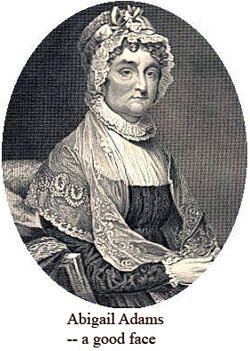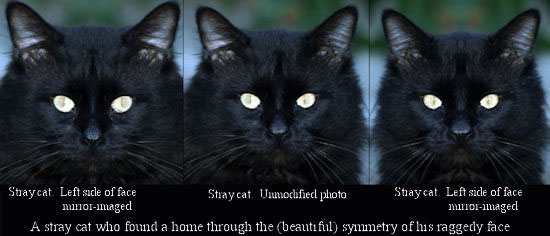The Beauty/Symmetry Puzzle
by Rob Zaretsky
Today, is beauty in the eyes of the beholder? The University of Houston's Honors College presents this program about the machines that make our civilization run, and the people whose ingenuity created them.
John Adams spent his life worrying over dangers facing our young nation. He faced the menace of foreign powers and the threats of domestic political opponents. And yet, at times he seemed most worried by ... beautiful people. He explained why in a letter to his friend Thomas Jefferson. Though America is founded on egalitarian principles, such principles are worthless when they come up against a citizen's physical appearance. Beauty, Adams told Jefferson, will always trump merit.
You should know that John Adams was no beauty: he was balding, bug-eyed and pudgy. And here he is, denouncing beauty's sway to Thomas Jefferson, who happened to be tall, handsome and commanding. Of course Adams was bitter! Who wouldn't be? It hardly seems fair.
Social scientists find that across the globe the beautiful are consistently rewarded. Beauty, not merit, usually predicts one's own salary and professional status. This would seem a bit less unjust if it were the case for public professions that do not require great talent. But as it turns out, it also applies to the least glamorous guilds. For example, the American Economic Association tested its own members for this apparently irrational weakness. They were shocked -- shocked! -- to find that they consistently preferred comely to competent candidates in the association's elections.
Now, no one likes to hear this. But scientists insist that few things in life are fairer than preferring the fair to the plain. Take the scorpion fly. Biologist Randy Thornhill discovered that the best-looking flies -- those with the most symmetrical wings -- always out-perform their less attractive peers during mating season. The reason is simple: perfect symmetry means good genes. As nature would have it, to those with the best genes go the spoils.
As for beauty, it's just another word for symmetry. In a series of tests, Thornhill showed his human subjects an array of human features, some more, some less symmetrical. They reacted like the scorpion fly: the more symmetrical, the more attractive the feature. Suddenly, affairs of the heart at the local singles bar do not seem all that different than those at the local swamp.
 It gets worse: beauty may also predict intelligence. Of course, it's very hard to define intelligence. Still, the concept of general intelligence is often used to quantify what is common to all intelligence tests. And it's possible that an individual's symmetry reflects general intelligence. If this is true, Hobbes's claim that life is solitary, poor, nasty, brutish and short applies only to those who are symmetry challenged.
It gets worse: beauty may also predict intelligence. Of course, it's very hard to define intelligence. Still, the concept of general intelligence is often used to quantify what is common to all intelligence tests. And it's possible that an individual's symmetry reflects general intelligence. If this is true, Hobbes's claim that life is solitary, poor, nasty, brutish and short applies only to those who are symmetry challenged.
Or maybe not. John Adams, at least, should have known better. Few individuals by intellect
alone have had a greater impact upon American history. Besides, can even the most symmetrical of beings boast of the happiness Adams knew in love? After all, he was married and loved by, yes, the equally plain, but equally impressive and mesmerizing Abigail Adams . As their love suggests, symmetry may well remain in the eyes of the beholder.
I'm Rob Zaretsky, at the University of Houston, where we're interested in the way inventive minds work.
R. Thornhill and J. Alcock, The Evolution of Insect Mating Systems.(iUniverse, 2000)
Beauty and Success: To Those That Have, Shall Be Given. The Economist, Dec. 19, 2007.
The Adams-Jefferson Letters. edited by Lester J. Cappon (Chapel Hill: UNC Press, 1988).
